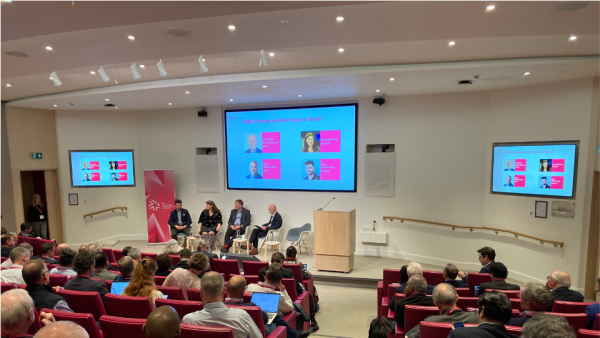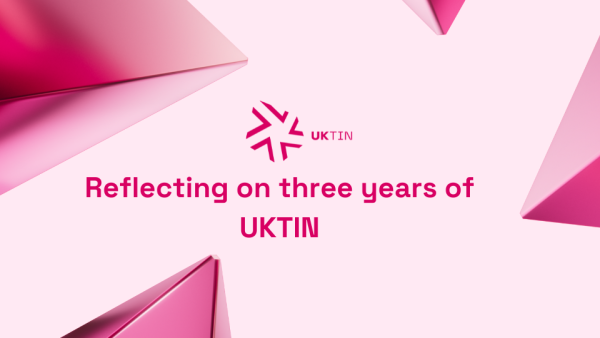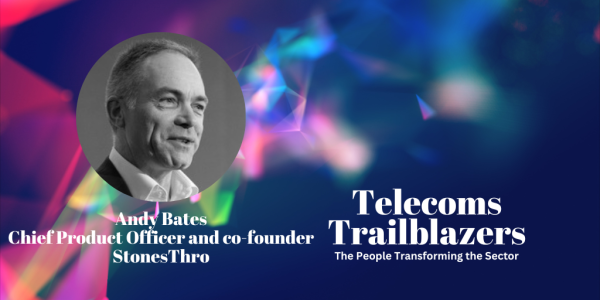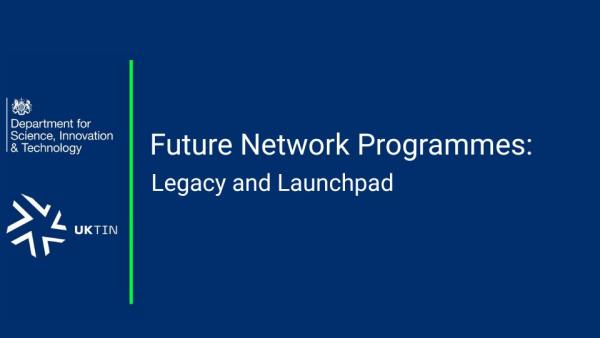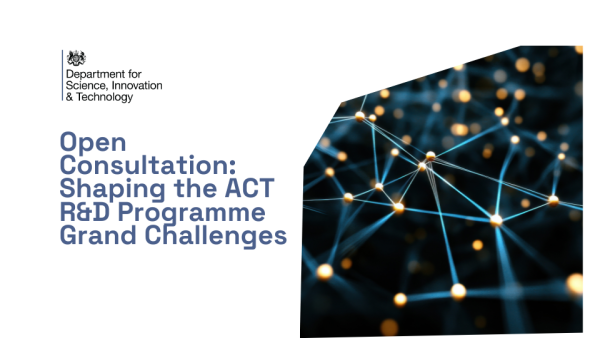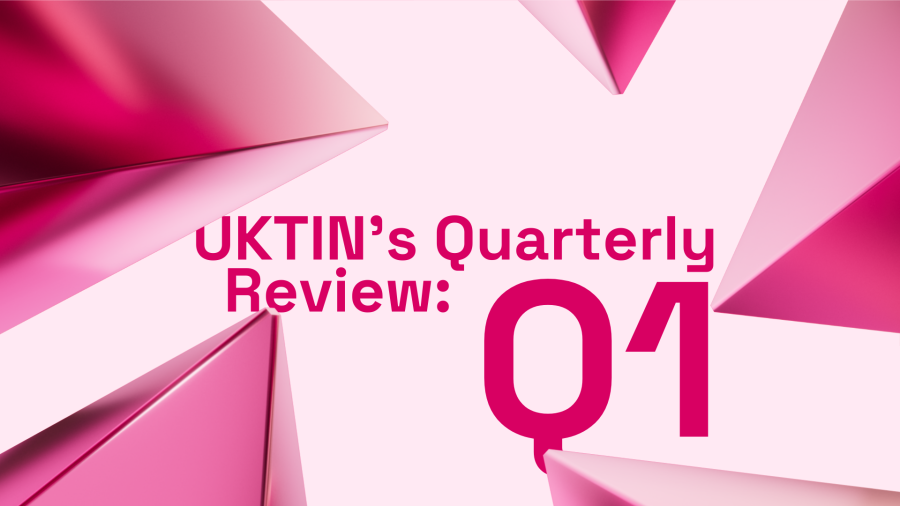
Designed to be an informal conversation that will provide a glimpse behind the scenes, UKTIN speaks to the consortium about the first quarter of UKTIN, with a focus on the recent stakeholder engagement event.
1/ Mobilisation has been a main priority for UKTIN since it started in October 2022. What has this meant for your organisation?
Mario De Miguel Ramos, Cambridge Wireless: One part of this has been trying to articulate what the plans are for each of the packages and workstreams. This has been discussed internally but also within the rest of the forum, focusing on how we can better coordinate and move forward as a collective. We made great progress with this in the first quarter, assigning tasks as well as recruiting. Our timelines have been very strict but we have managed to move forward relatively quickly. This is, in large part, due to the general excitement within the organisation but also because of clear-cut objectives.
Kishan Nundloll, Digital Catapult: We already had strong existing relationships within the ecosystem from the work we’ve done with SONIC Labs and our interactions with DCMS. But we realised that we needed to mobilise a few more people. We’ve been very fortunate that it has been pretty smooth sailing and DCMS is impressed with the results.
Jon Hunt, University of Bristol: We joined UKTIN because myself and my colleagues are very passionate about universities working with industry. We have mobilised key stakeholders within the University of Bristol and there is a real excitement and energy about working and connecting with the next generation of fast growing telecoms start-ups to stimulate further growth and innovation.
Pete Nevans, WM5G: For WM5G, there has been a real eagerness to hit the ground running. The UK has lots of R&D strengths that we want to build on, raising awareness and driving engagement with existing clusters to maximise the regions and devolved nations engagement. From a skills and training perspective, we know attracting the right skills and talent is critical to the success of telecoms innovation. Therefore a key focus for the team has been on starting to identify key stakeholders and commencing initial discussions to gain input and insight into our plans. We are reaching out across the UK and have already had some very positive calls. The feedback has been so positive; people are eager to learn more.
2/ What was the significance of the recent UKTIN stakeholder event?
Ramos: Most companies and institutions were very supportive of our consortium’s application for UKTIN but after the consortium was announced, there was a period of silence, understandably. Ahead of our formal public launch event, therefore, we decided to hold a smaller stakeholder event: this gave us a chance to explain our progress so far and outline our future plans.
Nundloll: From our point of view, it was very clearly an opportunity to say thank you to our supporters. But it was also a celebration of the work we have done and a great way to start the year. So much care and love have gone into this project and so many people helped to get it over the line. We wanted to make sure attendees knew how valuable their input was and even held a feedback session, which was very useful. Great things come out of roundtables and I left feeling particularly fortunate for the quality of participation.
Hunt: Just to give a slightly different take, the messages we brought away from the event were critical. I think they enabled us to unpack the disparity between industry and research requirements. There’s a real tendency to focus on academic interests rather than commercial needs. That’s one of the core reasons why I was keen on the university participating in the consortium. We’re very keen on bridging that gap. Yes, we recognise that the gap exists but the goals of universities and companies are complementary. Universities want to create impact and they want knowledge to be picked up, just like companies do. The event solidified this for me. It was great to hear discussions and genuinely, qualified why we’re so heavily engaged in UKTIN.
Nevans: The feedback from the event was really important from the viewpoint of gaining some real insight. It was also useful in terms of the market analysis that helped to generate some thinking: the future of technologies; how we approach UKTIN; the security aspects of networks; and more. There was lots of knowledge sharing and some terrific learnings from both sides.
3/ Looking ahead to the rest of the fiscal year, what are your immediate priorities?
Ramos: We’re just getting out of the mobilisation phase, and starting to focus on delivery. We have launched this year already the Supplier Specialist Guidance Service; this will get us closer to addressing the issues and questions that companies operating in the telecoms ecosystem are grappling with. We want to be able to incorporate feedback and set things in motion now. It’s about looking ahead. This first phase of preparation has been super exciting, particularly assembling the team and now it’s about the months ahead. It’s about delivering on the job.
Nundloll: Our immediate priority is to make sure we work with our partners, including both new and old, to establish a clear framework and deliver the best we can. Alongside this, we will be helping with the launch of special interest groups and collaborating with the wider industry. We want to focus on our long-term achievements, as opposed to short-term fixes.
Hunt: Linking back to the event, we had lots of discussions and largely agreed about the implementation phase and the role of the supply chain. That’s what we are targeting. We need to put these applications on the ecosystem map.
Nevans: We plan to create two focus groups: the UKTIN Clusters group, with an aim to maximise benefits for devolved nations and regions; and the UKTIN Talent group, to address market failures by convening stakeholders to map, publicise, facilitate and improve access to telecoms innovation, training and jobs. We aim to announce these two groups at the UKTIN launch event in April. Our immediate priority, therefore, is engaging with a wide range of stakeholders as possible and gathering information and data to inform our thinking and plans.
4/ What awaits the UK telecoms ecosystem in 2023?
Ramos: Well, that’s a challenging one. It’s a big question. The UK’s strengths lie in innovation and research. Not only can we help individual institutions but also the wider ecosystem (for example, understanding the different strands of government support). If we can assist in that respect, we can help map out and innovate more effectively. This should have a huge impact in terms of moving forward, ensuring the UK makes the most of its impressive telecoms sector.
Nundloll: There’s a big shift in the telecoms world right now and from a UK perspective, this is very positive. I can see a clear move to use cases: research innovation has become a priority. As for DC, we are incredibly well-placed. We have a brilliant relationship with the partners in the ecosystem and the mobile network operators. We have our hands in the metaverse, as well as AI. The government is helping us with our plans. We feel very lucky but also see it as a clear indicator that there is a space being carved out in the UK for telecoms to evolve.
Hunt: This is a question for us, the industry and of course, DCMS. We’ve got to set up this network. There’s still some debate around what is the right model for stimulating innovation, in particular, moving products through the simple technology business levels. For a long time, we have been discussing whether we need more national entities like Fraunhofer in Germany. We have lots of examples to draw upon that are really good. The automotive sector, for example, is pulled together as a single entity but also has a large amount of government cash, which is different to DC which has smaller allocations of funding. In Bristol, we have the National Composite Centre and ATI. These are the sorts of models that we need to consider alongside national innovation networks.
Nevans: In 2023, there’s going to be a lot of knowledge sharing across the ecosystem. Lots of new ideas! Hopefully, ideas that we can facilitate access to, whether it be different ranges of funding or expertise and skills. UKTIN is vitally important in the UK and it will gain traction but also likely have some challenges. In the past, there’s not been pressure or a great need to tackle these challenges but hopefully, the ecosystem will change this. Perhaps there will be a change in policies or closure of the skills gap. I’m looking forward to the market improving for the better.
5/ What would you like readers to know about UKTIN?
Ramos: We welcome any company, any player in the telecoms industry, that wants to talk to us or that needs support. This doesn’t just apply to companies operating in the UK but also to international companies willing to collaborate and innovate. UKTIN is here to welcome talent.
Nundloll: UKTIN has the ability to be an incredible driver for change going forward. We also see it as something we want to work on alongside our partners, progressing in our outputs that will hopefully bolster the UK economy.
Hunt: We are committed to maintaining a strong focus to ensure we are connecting people and enabling innovation to occur.
Nevans: We are keen to drive new talent and innovation into telecoms and grow the sector. Importantly, we can’t do this on our own and we are extremely passionate about ensuring the network drives this change but working with all existing players and encouraging new entrants. A big challenge and one we are looking forward to helping drive.


